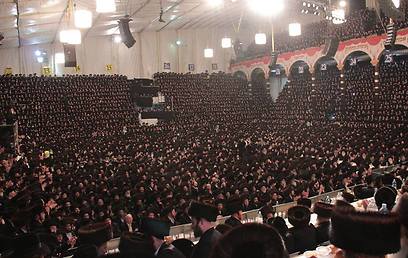
Study: Without Holocaust, there would be no haredim today
Researcher finds there were only several thousand yeshiva students in Europe before World War II. Survivors of Nazi genocide realized they must fight to restore world of Torah.
A study conducted by Dr. Michal Shaul reveals that the haredi world's development and increased power in the past 60 years was actually the result of the Holocaust. The data she compiled during her doctorate are now presented in a new book called "Beauty for Ashes."
According to Dr. Shaul, the world of Torah was in a process of disappearing until the Holocaust, and if it wasn’t for the dreadful disaster suffered by the Jewish people, it's possible that there would be no ultra-Orthodox world today.
"In the early 20th century, the world of Torah was in a deep crisis," she says. "Jewish Orthodoxy was nearly extinct. It was consumed by the Jewish Enlightenment movement, Zionism and Socialism, and there was a major shift towards those movements. According to estimates, there were only several thousand yeshiva students in Eastern Europe before the war."
It was the huge destruction which caused Holocaust survivors to take urgent action, she says. "They realized that it was 'to be or not to be,'" she explains. When the survivors saw that almost the entire world of Torah had gone up in flames after the war, and upon the establishment of the secular State of Israel, religious leaders and common people came to the conclusion that they to fight to restore the world of Torah.
"It's likely that without the Holocaust, the world of Torah would have become extinct," Dr. Shaul believes.
Perpetuating the lost Torah
According to the researcher, there is a denial among the haredi public regarding the magnitude of the rift created by the Holocaust. Although the Holocaust was a destruction of the geographic space of Hasidic dynasties, of culture and of language, she says, the haredi ethos focuses on continuity.
"The haredi society sees itself as an authentic memorial of what existed before the Holocaust, although that's far from being accurate," Dr. Shaul says. "This is what allows them to overcome."
"The most common way of commemorating the victims of the Holocaust in the haredi society is by publishing Torah books and dedicating them to the transcendence of the victims' souls," she adds.
According to Dr. Shaul, quite a few people who were the only ones from their families to survive sought to publish remnants of their writings or other Holocaust survivors' writings in order to perpetuate the lost Torah.
"Those books included the victims' biblical discourses and writings which survived the Holocaust, and books lost in the Holocaust were reprinted, serving as written monuments for the annihilated communities, people and religious institutions."
Dr. Shaul further notes that "as opposed to the objection to the general Holocaust memorial days, the haredi society – or the Hasidic society, to be exact – developed regular days on the calendar for remembering the victims. Those were the rebbes' 'celebration' days or salvation days, which turned the sector's 'Holocaust remembrance day' into a day of giving thanks for the rescue miracle."
Hasidic dynasty rescued
In her book, Dr. Shaul tries to divert the discussion from the fact that some rebbes escaped the Nazis by the skin of their teeth while their followers were left behind. The joy over the salvation of the Hasidic dynasty eventually overshadowed the feeling of loss.
"The day of salvation celebrated by many Hasidic movements is presented today as the joy over the salvation of the Torah and of the entire Hasidic dynasty, rather than as a day of personal joy for the rabbi," she says.
"The day of salvation strengthened the myth of the Torah rescue miracle in our time, and the status of rebbes as those who restored the world of Torah. Once the Hasidic movements grew, these gatherings turned into a show of force of the Hasidic movement, which aims – among other things – to strengthen its pride and serve as clear proof of the victory of its way."











